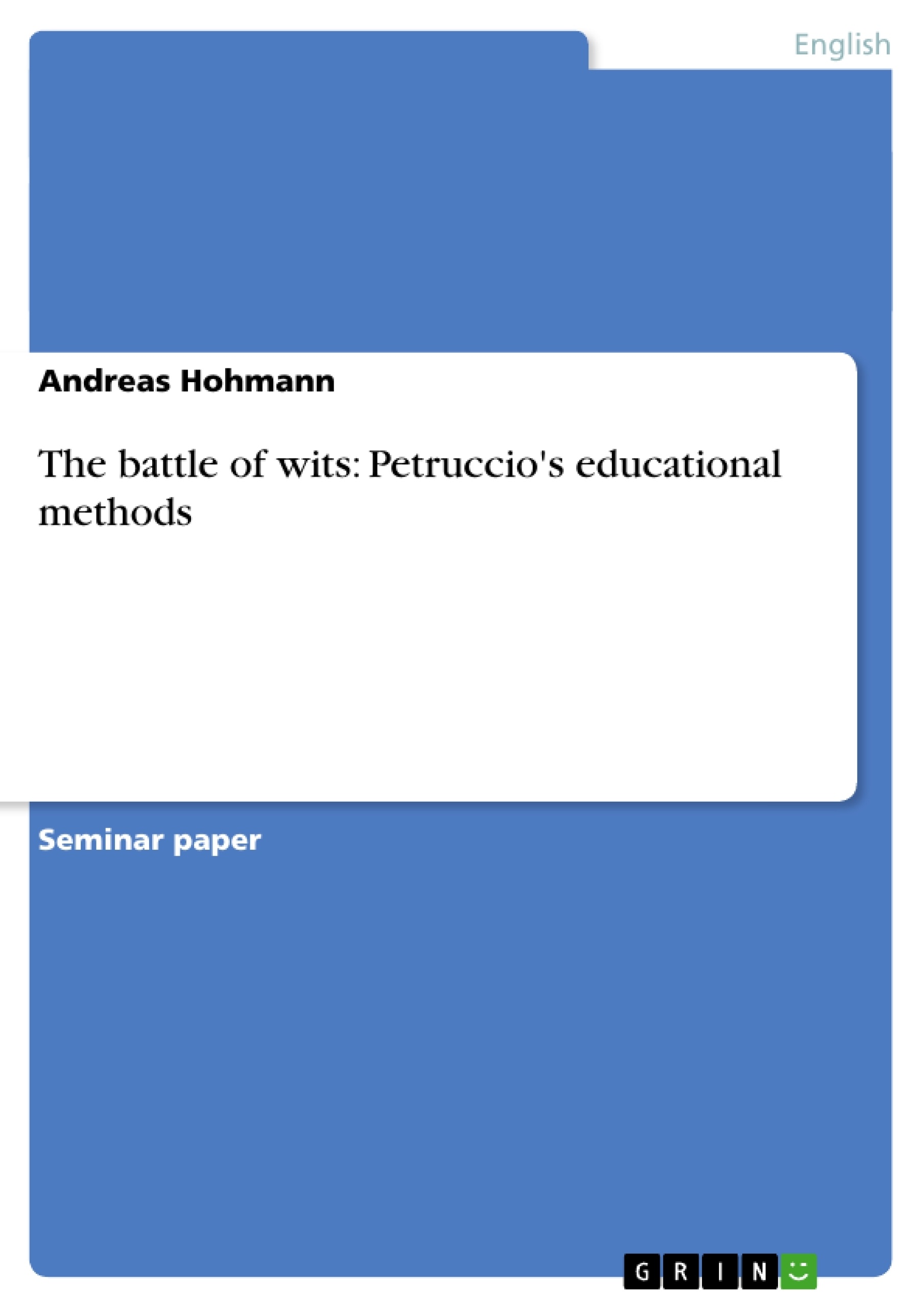Shakespeare explores the theme of comic sexual warfare between men and women in The Taming of the Shrew, says Francois Laroque (1997, p. 64). Shakespeare’s play consists of a frame tale which introduces two interlinked plots. The frame story deals with a poor tinker, Christopher Sly, who is found drunkenly by a nobleman. This nobleman enjoys to play a joke on the poor tinker’s expense making him believe he is a nobleman with all the luxury of servants, a wife, fine food and drink at his command. In this way, Christopher Sly comes into the joy of watching a troupe of players enact a “comedy of courtship and marriage involving two lines of action” on the order of the true nobleman. The first line of action is concerned with Katherine, the elder sister of the Minola siblings, who “is ‘tamed’ by a strong-willed, fortune-seeking suitor named Petruchio” (Howard, J.E., 1997, p. 133). The second, however, deals with Bianca Minola, the younger daughter of Baptista Minola, the father of the two. She is wooed by three different adoring suitors at a time and “eventually elopes with one of them without her father’s knowledge or consent.” (Ibid). Catherine Bates (2002, p. 108), however, regards The Taming of the Shrew as being a brisk comedy which is laid on to entertain the drunken Christopher Sly. Edward Berry (2002, pp. 123-138), nevertheless, sees Katherine being the shrew who is “mocked, abused, and tormented into submission by Petruchio (Ibid, p. 124). Edward Berry also states that “the play in which Katherine is tamed is a play within a play, performed at the request of a hunting lord, who uses it to show the beggar, Christopher Sly, how grand it is to live his kind of life”(Ibid, p. 132).
Inhaltsverzeichnis (Table of Contents)
- Introduction
- Main Part
Zielsetzung und Themenschwerpunkte (Objectives and Key Themes)
This paper explores Petruchio's methods of "taming" Katherine, the so-called "shrew," in Shakespeare's play The Taming of the Shrew. It investigates how Petruchio's actions are portrayed within the play, and what the overall themes of the play are. This analysis focuses on the relationship between Petruchio and Katherine, exploring the methods of Petruchio and the motivations of both characters.
- The portrayal of Katherine as a "shrew" and the consequences of her behavior.
- Petruchio's motivation for marrying Katherine and his methods of taming her.
- The dynamics of the relationship between Katherine and Petruchio, particularly their use of wit and their "battle of wits."
- The play's exploration of gender roles and societal expectations.
- The impact of Petruchio's taming methods on Katherine's personality and behavior.
Zusammenfassung der Kapitel (Chapter Summaries)
- Introduction: This section introduces the play and its setting, highlighting the theme of comic sexual warfare between men and women. The paper briefly explains the plot structure of the play, including the frame story and the two main storylines: the "taming" of Katherine by Petruchio and the romantic pursuits of Bianca. It also presents various interpretations of the play, including those that view it as a light comedy and those that emphasize the controversial nature of Petruchio's actions.
- Main Part: This chapter delves into the specifics of Petruchio's educational methods, focusing on Katherine's characterization as a "shrew" and the reasons for her behavior. It examines how Katherine's rebellious nature stems from her lack of a mother's love and her father's neglectful treatment. The section also explores Petruchio's character, highlighting his cynicism and his deliberate use of wit to manipulate society and find a wealthy wife. The chapter then delves into the first meeting between Petruchio and Katherine, analyzing their initial verbal sparring and their mutual understanding of their roles in the game of courtship. It concludes with Petruchio's sudden announcement of their wedding and Katherine's initial resistance.
Schlüsselwörter (Keywords)
This paper explores the themes of gender roles, courtship, manipulation, and the portrayal of women in Shakespeare's The Taming of the Shrew. The main focus is on the relationship between Petruchio and Katherine, including the techniques of "taming" and the motivations of both characters. Key concepts include the "shrew," verbal sparring, social expectations, and the changing dynamics of power within the relationship.
Frequently Asked Questions
What are Petruchio's primary methods for "taming" Katherine?
Petruchio uses a "battle of wits," verbal sparring, and psychological manipulation to challenge Katherine's rebellious behavior and force her into submission.
Who is Christopher Sly in The Taming of the Shrew?
Christopher Sly is a drunken tinker in the play's frame story who is tricked by a nobleman into believing he is a lord watching a play performed by a troupe of actors.
How is Katherine characterized in the play?
Katherine is portrayed as a "shrew"—a headstrong and rebellious woman whose behavior is attributed to a lack of maternal love and neglect by her father, Baptista.
What is the second plotline involving Bianca Minola?
The second plot involves Bianca, Katherine's younger sister, who is pursued by three suitors and eventually elopes with one without her father's consent.
What role does wit play in the relationship between Petruchio and Katherine?
Wit serves as a weapon in their "comic sexual warfare," where both characters use verbal agility to test each other and navigate societal expectations of gender roles.
- Quote paper
- Andreas Hohmann (Author), 2003, The battle of wits: Petruccio's educational methods, Munich, GRIN Verlag, https://www.grin.com/document/49231



